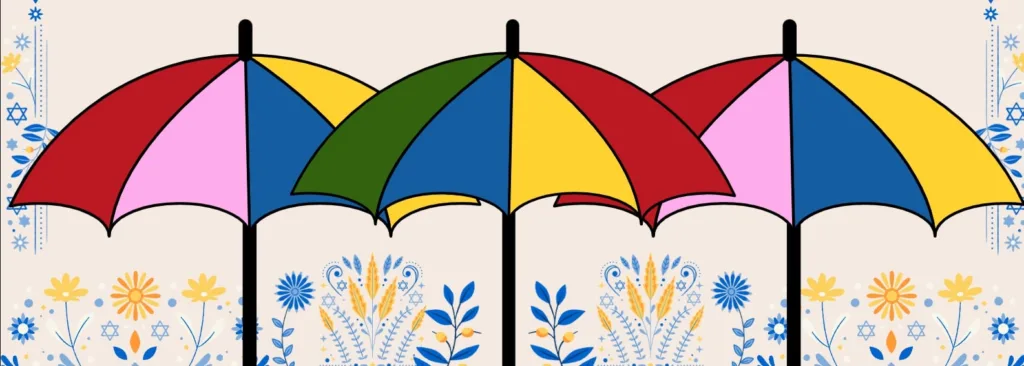What Even IS Sigd? A Short Explainer

What’s Sigd all about?
Sigd (pronounced sihgd with one syllable) is celebrated on the 29th of the Hebrew month of Cheshvan, exactly 50 days after Yom Kippur (this year it’s on November 19-20). The name “Sigd” means “prostration” in Ge’ez, an ancient South Semitic language. Sigd commemorates Beta Israel’s desire to return to Jerusalem that was originally expressed by the prophets Ezra and Nehemiah while exiled in Babylon. Sigd is also a time for renewing the Israelite covenant with God, preserving Jewish identity, fasting and praying in communal repentance, and creating unity.
Praying for the Great Temple in Jerusalem to be rebuilt is the central religious theme of Sigd. Upon the modern-day return of Jews to Israel, many Beta Israel questioned whether there was a need to continue celebrating Sigd if we already fulfilled the prophecy of returning to Israel. But because the Third Temple has never been restored, the religious mandates to observe Sigd remain, and the Beta Israel continue to recognize and observe the traditions of this special day.
History of Beta Israel
A Jewish community in Ethiopia — the Beta Israel (House of Israel) — has existed for at least 15 centuries. Most likely, the Beta Israel arrived in Ethiopia between the first and sixth centuries, coming as merchants or artisans from various countries in the region.
Facing religious persecution in Ethiopia, more than 90,000 Beta Israel have made aliyah (immigrated) to Israel since 1977 through various emergency operations and through the Jewish Agency. Because they lived in complete isolation from other Jewish communities for so long, some Beta Israel holidays and celebrations do not exist in other Jewish communities.
How do people celebrate Sigd?
Beta Israel folks traditionally begin Sigd in the evening with prayers and preparation of special food to be eaten after the fast. In the morning, it is traditional to bathe in a river before climbing the highest mountain around them, dressed up in traditional white clothing. Some carry stones on their head to signify the sins for which they are repenting. Once at the top of the mountain, the stones are placed where the kesim (spiritual and religious leaders) stand during the ceremonial prayers and readings.
Kesim carry beautiful, colorful umbrellas meant to create shade for the community. Once on top of the mountain, scriptures (which are called the Octateuch, the five books of Moses plus Joshua, Judges and Ruth) are read aloud. The community spends the day asking for forgiveness (much the same way as on Yom Kippur) and redemption to return to Jerusalem after being in exile for thousands of years, and expressing their love of Torah and God. The vibe is festive, humble, and communal.
Traditionally, members of the Beta Israel community fast on Sigd. The fast ends mid-day with a feast an lots of dancing. Sigd is also an opportunity for households to come together to make injera, a famous flatbread eaten with all meals. Other customary Sigd meals include lamb stew, and doro wot, a chicken stew. To wash it all down, bottles of homemade tej honey wine and beer are served with dabo, a thick wheat bread, delicious Ethiopian cheese, and honey.
Sigd in Israel
Since 2008, Sigd has been recognized as a state holiday in Israel. It’s celebrated for an entire month leading up to the 29th of the Hebrew month Cheshvan, and it is an opportunity to raise Ethiopian Jewish visibility and educate non-Ethiopian Israelis about Beta Israel customs.
Leaders from different cities organize buses to bring in people from all over Israel to the ceremony that is held on the Armon HaNatziv promenade which looks out over the Old City of Jerusalem and the site of the Temple Mount.
Can Non-Ethiopian Jews Celebrate Sigd?
Sigd is an invitation for non-Beta Israel Jewish community members to strengthen their connection to and understanding of the history of Beta Israel and the global diversity of Judaism. Outside of Israel, Sigd celebrations are a little hard to come by, but there are plenty of opportunities to celebrate and lift up Beta Israel culture and people! Below are a few ideas for how to connect during Sigd:

Learn a bit of Amharic, the language of Ethiopia. A good place to start is learning the phrase: Melkam Sigd bahal! which means “Happy Sigd!”

Dine out! If you are lucky enough to have an Ethiopian restaurant near you, check it out. Try the doro wat, fresh cheese, and injera, all popular dishes served during Sigd.

Get to know some Beta Israel artists and musicians. We love Gili Yalo, an Ethiopian Israeli musician, and Aveva Dese, a popular singer.

Sigd is a perfect time to learn more about Ethiopian Jewish culture and history. Yuvi’s Candy Tree, Yosef’s Dream, and Day of Delight: A Jewish Sabbath in Ethiopia are beautiful children’s books. There are also a number of books for older readers such as Daughters of the Ark and The Return.
Thank you to Waga Brok who collaborated with the Center for Jewish and Israel Education & Meyerhoff Center for Jewish Experience team of Hillel International on this resource!
Born in Ethiopia, Waga made aliyah to Israel as a part of Operation Solomon in 1991. She completed her BA in Education and currently works at Yemin Orde as part of the Outreach Team.
Her prior professional experience includes working with young women at Mechina Yemin Orde to help prepare them for their national service and serving as a Jewish Agency Israel Fellow to Champaign-Urbana Hillel at the University of Illinois where she was honored by both AIPAC as Campus ally of the year and the Maccabees Task Force. Waga has a tremendous passion for informal education and empowering the next generation.
Follow her on Instagram: @waga_brok